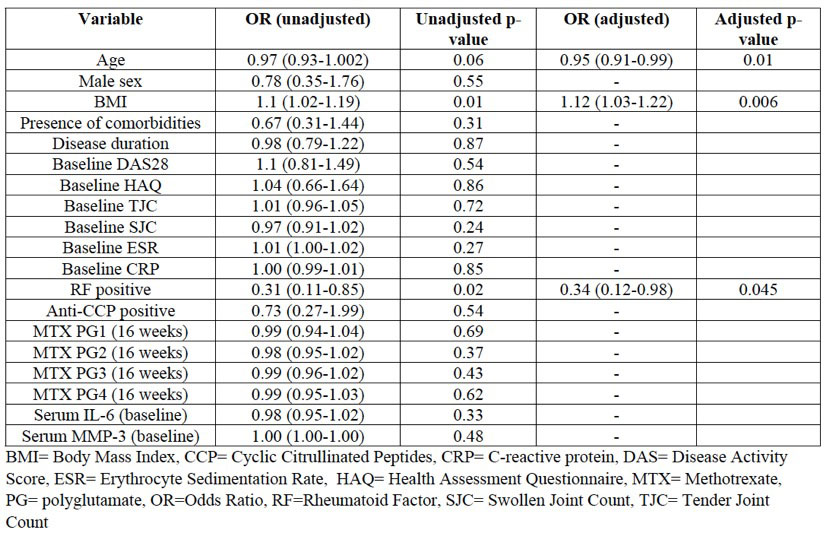Session Information
Date: Sunday, November 13, 2022
Title: RA – Treatment Poster II
Session Type: Poster Session B
Session Time: 9:00AM-10:30AM
Background/Purpose: Methotrexate (MTX) is the gold standard, first-line therapy for rheumatoid arthritis (RA). However, not all patients respond to MTX, and the predictors of its response or non-response have not yet been reliably identified. Identification of these predictors will facilitate personalized therapeutic choices, and improve patient outcomes. We thus sought to identify the demographic and clinico-laboratory predictors of response to MTX monotherapy in patients with active RA.
Methods: This study included patients with active RA (SJC≥2 and TJC≥4) aged 18-55 years, with disease duration < 5 years, who were not receiving DMARDs (except HCQ and low-dose prednisolone) and had been enrolled in the multicentre, parallel group RCT comparing two different MTX escalation strategies in RA (MEIRA). All these patients received MTX monotherapy which was started at 15 mg/week, escalated to 25 mg/week by 4-8 weeks, and continued till 16 weeks. MTX response was defined as EULAR good or moderate response (based on DAS28-3v) at 16 weeks. Stepwise, multivariable logistic regression was done using key demographic (age, gender, BMI, comorbidities), clinical (disease duration, DAS28, HAQ), and laboratory parameters (RF, anti-CCP, ESR, CRP, RBC MTX-polyglutamates 1-4, IL-6, MMP-3) as independent variables to identify predictors of MTX response. A two-tailed p-value < 0.05 was used for defining statistical significance. (Trial Reg: CTRI/2018/12/016549)
Results: Out of a total of 178 included patients [84% females, mean age 40 (9) years, mean DAS28-CRP=5.4 (1.1)], 113 (63.5%) were classified as MTX responders at 16 weeks. Age (OR=0.95, p=0.01), BMI (OR=1.12, p=0.006), and RF (OR=0.34, p=0.045) were found to be independent predictors of MTX response on multivariable analysis (Table 1). On sensitivity analysis with DAS28-ESR-based EULAR response, age (OR=0.94, p=0.003) and RF (OR=0.42, p=0.059) were replicated as independent predictors of MTX response, in addition to pre-treatment swollen joint count (OR=0.94, p=0.05).
Conclusion: Younger age, RF negativity, higher BMI, and lower pre-treatment swollen joint count are potential predictors of response to MTX monotherapy in RA.
To cite this abstract in AMA style:
Jain S, Dhir V, Aggarwal A, Gupta R, Laishangtham B, Khullar A, Naidu S, Dhawan V, Sharma S, Sharma A, jain s. Predictors of Methotrexate Monotherapy Response in Patients with Active Rheumatoid Arthritis: Results from a Multicentre, Randomized Controlled Trial [abstract]. Arthritis Rheumatol. 2022; 74 (suppl 9). https://acrabstracts.org/abstract/predictors-of-methotrexate-monotherapy-response-in-patients-with-active-rheumatoid-arthritis-results-from-a-multicentre-randomized-controlled-trial/. Accessed .« Back to ACR Convergence 2022
ACR Meeting Abstracts - https://acrabstracts.org/abstract/predictors-of-methotrexate-monotherapy-response-in-patients-with-active-rheumatoid-arthritis-results-from-a-multicentre-randomized-controlled-trial/

